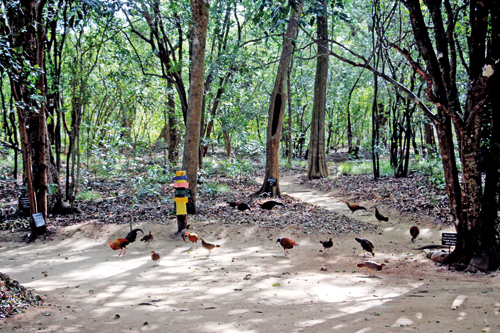Popham’s green legacy will live on
Sam Popham — the man behind the unique arboretum in Dambulla is no more

The Sam Popham Arboretum: Green oasis in Dambulla
It was a sad day for many environmentalists and conservationists to hear of the passing of Francis Home Popham, more widely known as Sam Popham, on May 28 in the UK.
Popham established the Sam Popham Arboretum, now called the National Institute of Fundamental Sciences (NIFS Sam Popham Arboretum), in Dambulla over five decades ago. An arboretum is essentially a place where trees and shrubs are grown for both scientific and aesthetic purposes and here Popham utilised what later became known as the Popham Method and what is now called Assisted Natural Regeneration (ANR).
Under the Popham method, or ANR, the growth of the natural forest seedlings is assisted by removing or controlling weeds and epiphytes periodically thereby allowing dormant seeds and seedlings to flourish.
Born in 1923 in England, Popham made his first visit to the island as a naval officer in the Royal Navy close to the end of the Second World War. Despite only a brief stint in the country, he was fascinated and returned after several years to take up tea planting.

Popham: A man before his time
In 1963, after a few decades of planting, Popham purchased seven and a half acres of scrub forest in Dambulla and proceeded to clear any invasive plants while leaving the indigenous species to grow on their own. “He allowed the jungle to regain itself on its own but he facilitated that by eliminating the invasives – the weeds, other plants which affected the growth of the natural forest,” says Dushy Perera, President of Ruk Rakaganno (Tree Society of Sri Lanka).
In 1989 Popham gifted this 7.5-acre arboretum to the Institute of Fundamental Sciences (IFS) in Kandy, which then proceeded to expand the arboretum to its present 34.5 acres by obtaining the adjoining land of 27 acres.
Several endangered indigenous species of trees and plants find a safe haven within this vast forest land. The Ebony tree (Diospyros ebenum) or ‘Kaluwara’, known for its valuable wood, the Ceylon Satinwood (Chloroxylon swietenia) and the Trincomalee Wood (Berrya cordifolia), also known as Halmilla are among the approximately 100 species of timber trees and 70 species of medicinal plants found in the arboretum along with more than 350 other plant species.
The arboretum is not just home to trees and plants – it boasts 25 species of mammals including bats, 83 species of birds, 77 species of butterflies and 12 species of dragonflies. Endemic Junglefowl, Grey Hornbills, and Paradise Flycatchers are some of the birds often spotted here. The Grey Slender Loris is among the endangered species taking refuge in this forest.
Popham continued to work and live in the arboretum, in a bungalow designed by his friend Geoffrey Bawa until 1999 when he returned to England. When not immersing himself in his arboreal sanctuary, he was “an avid reader and left behind more than 100,000 books,” says Jayantha Amarasinghe, who initially started working for Popham in 1994 and took over as curator when Popham left. “He was especially a fan of books on Buddhism.”
Mr Amarasinghe, now retired was dedicated to the arboretum and conducted the first night safari in Sri Lanka to observe the Grey Slender Loris and was also instrumental in the arboretum receiving the Trip Advisor Certificate of Excellence for six consecutive years.
Describing his mentor as a great man, Mr Amarasinghe says Popham’s main objective was to protect indigenous medicinal and other plants for future generations. He fondly remembers a conversation where he asked Popham why he didn’t get married and his reply that he was already married. Seeing Mr Amarasinghe’s surprise, he had quipped, “I’m married to these trees.”

The house that Geoffrey Bawa built for Sam Popham
After his departure, the arboretum, was overseen by Ruk Rakaganno, which managed it for 15 years. The society established an Environment Resource Centre and started educational programmes for schools to encourage future conservationists. The arboretum is also a site of research for many groups with an interest in fields such as restoration ecology, animal behaviour, and taxonomic studies on flora and fauna.
Mr Perera says Popham was an individual ahead of his time in terms of environmentalism and conservation. “His concept was unique. When nobody thought about the environment and protection of the environment, he established this bit of land and rght in the middle of barren land you get this natural forest. It’s like going from being in a hot room to an air-conditioned room when you walk into the arboretum,” says Mr Perera.
This natural forest is also a popular tourist site for those interested in biodiversity and nature – it’s not difficult to see why. Visitors can walk the marked trails during the day and at night to experience all that it offers.
Mr Amarasinghe recalls a particular day when he and Popham were walking through the arboretum. “He said that he wants to live here another 50 years. I then asked him why – as he was already in his eighties. He replied saying he wanted to live that long to see the matured natural forest.”
The fruits of Popham’s labour can be observed in his arboretum – his legacy. Just like the trees that have put down their roots within this land, his legacy is also perennial.
Hearing the story of Sam Popham, the opening stanza of the poem by Joyce Kilmer comes to mind – “I think that I shall never see, a poem as lovely as a tree”.
Searching for an ideal partner? Find your soul mate on Hitad.lk, Sri Lanka's favourite marriage proposals page. With Hitad.lk matrimonial advertisements you have access to thousands of ads from potential suitors who are looking for someone just like you.


